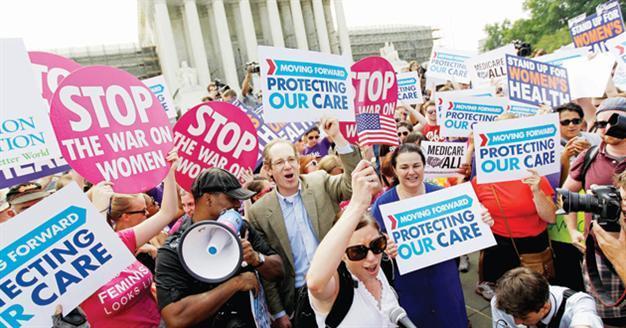Obama, Romney trying to gain votes on Obamacare

Supporters of Obama’s healthcare law celebrate outside the Supreme Court in Washington. The law seeks to provide health insurance to more than 30 million people. AP photo
The battle over U.S. President Barack Obama’s landmark healthcare law has shifted from the Supreme Court to the campaign trail, as Republican challenger Mitt Romney asked voters to throw Obama out of office in order to kill the law, which is unpopular with many.
The law, aimed at providing healthcare coverage for more than 30 million uninsured Americans, surely handed Obama a huge election-year political victory, keeping in force the legislative centerpiece of his term. On the other hand, the high court’s 5-4 decision to uphold the law was a setback for Romney and his fellow Republicans, who had hoped that Obama’s central policy achievement would be struck down as unconstitutional.
“Our mission is clear: If we’re going to get rid of
Obamacare, we’re going to have to replace President Obama,” Romney said, speaking from the roof of a building overlooking the U.S. Capitol. The law, which constitutes the $2.6 trillion U.S. healthcare system’s biggest overhaul in nearly 50 years, sought to provide health insurance to more than 30 million previously uninsured Americans and to slow down soaring medical costs.
Two thumbs up
Obama was standing outside the Oval Office when he saw the news on television just after 10 a.m. on June 28. Two networks, CNN and Fox News, reported the Supreme Court had struck down the centerpiece of his landmark healthcare law. He looked quizzically at the TV screen. Moments later, his face brightened. White House Counsel Kathryn Ruemmler walked in and flashed him two thumbs-up. Obama experienced some cognitive dissonance at that moment, a senior administration official told reporters.
Most Americans oppose the law even though they strongly support much of what it does, according to a recent Reuters/Ipsos poll. “Whatever the politics, today’s decision was a victory for people all over this country,” Obama said, speaking on national television from the White House.
While the court decision avoids an embarrassment for Obama in an election year, it could energize conservative voters who were slow to warm to Romney during a months-long battle for the Republican Party nomination. More than $1.5 million in donations poured in to Romney’s campaign in the hours following the decision, according to an aide.
The decision could also help Romney win undecided voters, who oppose the law by a four-to-one margin, according to the poll. “This is great politically. Bad for the country, but great politically,” a Romney adviser said. Still, it remains to be seen whether the decision will truly shape the contours of a presidential race in which concerns about the shaky economy have crowded out issues like healthcare and the war in Afghanistan.
Little chance of repeal
“It should be pretty clear by now that I didn’t do this because it was good politics,” Obama said. “I did it because it was good for the country.” Romney cast his opposition to the law in economic terms, arguing that its tax increases and new regulations would hurt job creation and the overall size of the program would increase the national debt. “If we want good jobs and a bright economic future, for ourselves and for our kids, we must replace Obamacare,” he said.
The reasoning in the court decision also gives Republicans a new talking point by casting the law’s most controversial element – a requirement that individuals must buy health insurance or pay a penalty – as a tax, rather than a mandate.
Romney’s vow to repeal the law could prove difficult. Even if his fellow Republicans win both chambers of Congress in the Nov. 6 elections, Democrats, who control the Senate, will likely retain enough seats in the chamber to keep the law in place. The Republican-controlled House of Representatives voted to repeal the healthcare law last year and has scheduled another repeal vote for July 11. The measure has little chance of passing the Senate.
USA,
